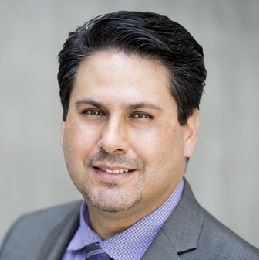
MAT and Complex Patients: Addressing Provider Concerns
Dr. San Bartolome provides case studies and information about managing care for complex patients with addictions who use more than one substance (polysubstance use).
Learning Objectives:
At the end of this session, learners should be able to:
Identify key safety considerations when treating complex, polysubstance use cases for MAT, and
Explain 2 strategies for addressing complicated inductions involving methadone and fentanyl.
Target Audience:
This activity is designed for family medicine physicians, and other primary care team members.
Participation and Credit:
There is no credit for this activity.
Support:
This activity is supported by the California Academy of Family Physicians.
Fee:
There is no charge for this activity.
Cultural/Linguistic Competency:
CAFP policy and California state law requires that each learning activity have elements of cultural and linguistic proficiency included in the content. The definition of cultural and linguistic competency is the ability and readiness of health care providers and health organizations to humbly and respectfully demonstrate, effectively communicate, and tailor delivery of care to patients with diverse values, beliefs, identities, and behaviors, in order to meet patients’ social, cultural, and linguistic needs as it relates to patient health. This activity meets these requirements.
Implicit Bias:
CAFP policy and California state law requires that all CME activities comprising a patient care element include either (1) examples of how implicit bias affects perceptions and treatment decisions of physicians and surgeons, leading to disparities in health outcomes and/or (2) strategies to address how unintended biases in decision-making may contribute to health care disparities by shaping behavior and producing differences in medical treatment along lines of race, ethnicity, gender identity, sexual orientation, age, socioeconomic status, or other characteristics. This activity meets these requirements.
Privacy Policy:
The California Academy of Family Physicians (CAFP) is committed to protecting the privacy of its members and customers. CAFP maintains safeguards to store and secure information it has about members and customers. The safeguards may be physical, electronic or procedural. For more information, contact [email protected].
Questions:
For questions regarding the content of this activity or for technical assistance, contact [email protected].
The CAFP has made all reasonable efforts to ensure that information contained herein is accurate in accordance with the latest available scientific knowledge at the time of accreditation of this continuing education program. Information regarding drugs (e.g., their administration, dosages, contraindications, adverse reactions, interactions, special warnings, and precautions) and drug delivery systems is subject to change, however, and the learner is advised to check the manufacturer's package insert for information concerning recommended dosage and potential problems or cautions prior to dispensing or administering the drug or using the drug delivery systems.
Any medications or treatment methods suggested in this CME activity should not be used by the practitioner without evaluation of their patient's condition(s) and possible contraindication(s) or danger(s) of use of any specific medication.
Copyright:
© 2023 California Academy of Family Physicians. No part of this activity may be used or reproduced in any manner whatsoever without written permission except in the case of brief quotations embedded in articles or reviews.

Mario San Bartolome, MD, MBA, MRO, FASAM
Dr. Mario San Bartolome is board certified in both Family Medicine and Addiction Medicine. He has experience in all levels of care related to substance use disorders, serves vulnerable populations through FQHCs in Orange County, and is very active in both the American Society of Addiction Medicine and California Society of Addiction Medicine, where he serves on the Board of Directors.
Conflict of Interest Statements:
The Committee on Continuing Professional Development and CME will be responsible for mitigating any relevant financial relationships disclosed by an individual who may have influence on content, who have served as faculty, or who may produce CME/CPD content for the CAFP. Mitigation may include learner notification, peer review of content before presentation, requirement of EB-CME, changing topics, or even dismissing a potential faculty member.
It is the policy of the CAFP to ensure independence, balance, objectivity, scientific rigor, and integrity in all continuing education activities. All individuals with potential to influence the content of this program have submitted Disclosure of Interest declarations that have been reviewed according to policy. Learner notification of declarations is below. All individuals with relevant financial relationships with ineligible companies have been contacted by CAFP staff or CCPD members, and issues of conflict have been discussed and mitigated.
Faculty Disclosure:
Mario San Bartolome has no financial relationships with ineligible companies to disclose.
CME Planners:
The following planners have no financial relationships with ineligible companies to disclose: Jerri Davis, Laurie Isenberg

 Facebook
Facebook X
X LinkedIn
LinkedIn Forward
Forward